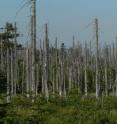Improving China's acid rain control strategy
Scientists are reporting the first evidence that China's sharp focus on reducing widespread damage to soil by acid rain by restricting sulfur dioxide air pollution may have an unexpected consequence: Gains from that pollution control program will be largely offset by increases in nitrogen emissions, which the country's current policy largely overlooks. The study, which suggests that government officials adapt a more comprehensive pollution control strategy that includes a new emphasis on cutting nitrogen emissions, is scheduled for the Nov. 1 issue of ACS' Environmental Science & Technology, a semi-monthly journal. Lei Duan and colleagues explain that China is trying to stop soil acidification by reducing sulfur dioxide pollution from electric power plant smokestacks. Those emissions cause acid rain, which in turn has made vast areas of farmland more acid and less productive. China's is striving for a 10 percent reduction in sulfur dioxide emissions by 2010, a policy that seems have had only a limited impact so far, the researchers say. However, China has paid little attention to pollution from nitrogen oxides, which also contribute to acid rain and soil contamination.
The scientists' analysis found that the benefits of sulfur dioxide reductions will almost be offset by increased nitrogen emissions. To control this problem, "China needs a multipollutant control strategy that integrates measures to reduce sulfur, nitrogen, and particulate matter," the article notes.
Source: American Chemical Society
Other sources
- China's Acid Rain Control Strategy Offset By Increased Nitrogen Oxide Air Pollutionfrom Science DailyThu, 15 Oct 2009, 2:28:11 UTC
- Improving China's acid rain control strategyfrom PhysorgWed, 14 Oct 2009, 19:42:30 UTC
